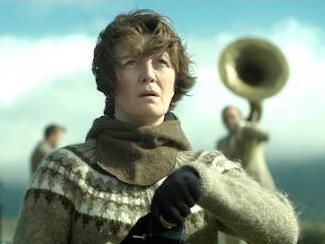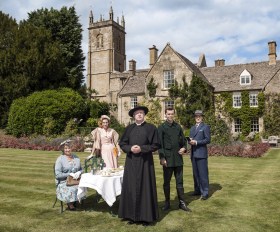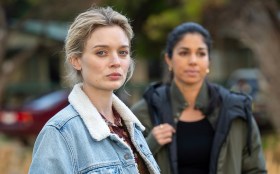From Joan of Arc onwards, there has often been a grim, humourless quality to cultural depictions of rebel women. War is serious business. But the recent death of filmmaker Agnès Varda made me reflect on the possibilities for joy and wit in feminist cinema. And in Woman at War, Icelandic writer-director Benedikt Erlingsson highlights not only the rage and ferocity of women’s activism, but also its playfulness, generosity and tenderness. It’s a delightful film: beautifully shot, full of joyous symbolism, and with a deft central performance from Halldóra Geirharðsdóttir.
The film opens on Iceland’s spectacular central highlands, with the kind of Amazonian archery that’s familiar from films such as The Hunger Games and Wonder Woman. Wearing jeans and a traditional lopapeysa jumper, Halla (Geirharðsdóttir) attaches a slender cable to an arrow, then shoots it over an electric power line. With gloved hands she tugs on the cable, ripping down the wire. The target of Halla’s sabotage is a Rio Tinto aluminium plant, which goes into shutdown mode until workers can bring an auxiliary generator online.
We also get our first taste of Erlingsson’s mischievously theatrical storytelling: as oompah-style music swells on the score, the shot pans to show the trio of musicians: a pianist and accordionist (composer David Thor Jonsson), sousaphonist (Omar Gudjonsson) and drummer (Magnús Trygvason Eliassen), soundtracking the action live on the grass behind Halla.
Throughout the film, they reappear: in Halla’s apartment; along the roads she travels; atop buildings; in airport concourses. What I enjoyed most about this diegetic approach is that the musicians themselves follow Halla’s actions with their gazes, expressions and gestures, and at times she acknowledges their presence. They witness and report on Halla’s one-woman environmental campaign, like a Greek chorus. Music, here, is inextricable from the stuff of life.
Halla has received some momentous news. After years on a waiting list, and despite being a single 50-year-old woman, she’s just been approved to adopt Nika, a four-year-old Ukrainian war orphan.
Accordingly, a trio of Ukrainian folk singers (Iryna Danyleiko, Galyna Goncharenko and Susanna Kurpenko) joins the musicians. Clad in colourful costumes and headdresses, their distinctive figures seem strange in this landscape. But they also represent a utopian cross-cultural connection, as Halla wrestles with how to reconcile her solitary activism with impending motherhood.
It’s a clever way to communicate the powerful and beguiling idea that activism isn’t separatist, requiring a radical break from the everyday. Indeed, it’s the opposite: Halla is defending ordinary Icelandic life and safeguarding her daughter’s future. Her name evokes a famous 18th-century Icelandic outlaw and folk heroine, who evaded capture for decades in the central highlands.
Music fills Halla’s mild-mannered life, too. Away from her secret eco-terrorist identity, she’s a bike-riding, lap-swimming community choir director, as warm and garrulous as the Woman of the Mountain is determined and severe. Indeed, one of her choristers (Albert Halldórsson) is her chief informant: a government official-turned-whistleblower. Their plotting sessions take place during rehearsals – after they’ve carefully placed their phones in the freezer.
Part of the pleasure of this film is the way it weaves thriller elements into the gentle fabric of community. Yes, Halla is seen hiding from police helicopters and drones in crevasses and under moorland overhangs. Yes, in one inspired moment she drapes herself with the carcass of an Icelandic sheep to evade thermal imaging surveillance. Yes, she sneaks into a hotel and clambers onto the roof to fling copies of her manifesto.
But when Halla sneaks into an antiques shop for a typewriter to produce the manifesto, the assistant says, “You’re always welcome.” She belongs here, unlike the beleaguered Spanish backpacker (Juan Camillo Roman Estrada) who, in the film’s best running gag, is repeatedly arrested for Halla’s crimes.
But community, Erlingsson shrewdly observes, is a double-edged sword. Although Halla herself may elude them, the Icelandic media and political establishment quickly demonise her radical ideas. As the President (Jón Gnarr) attends an event at a heritage site, he explains how Viking chiefs of old would make decisions by standing in a “ring of power”. Then, as he and his officials plot how to discredit the Mountain Woman’s manifesto, the camera swoops overhead to show them clustered in a tight circle.
It’s the ethic of family care that saves Halla. Her twin sister Ása (also played by Geirharðsdóttir) is a yoga instructor: a laid-back hippie who disagrees with direct action and favours incremental change. But Ása’s sisterly love takes an unexpected, wonderful turn late in the film.
She has another ally in local sheep farmer Sveinbjörn (Jóhann Sigurðarson), who sneaks her past police cordons, lends her a car and saves her from hypothermia in a hot spring. Thanks to Iceland’s small population and sharp memory for genealogy, they are “alleged cousins”.
The final shot of the film is a moment both baptismal and apocalyptic. Weaving together the threads of family love and community action, with the musicians following as if in a parade, it underscores that however hard our struggle to be good people who step lightly on the earth, we’re all in it together.
|
4 stars
|
★★★★
|
Director: Benedikt Erlingsson
Iceland, 2018, 101 minutes
Release date: 4 April
Rated: M
Actors:
Director:
Format:
Country:
Release:





